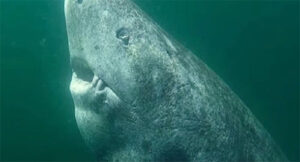Scientists Uncover 512-Year-Old Greenland Shark, Possibly the Longest-Living Vertebrate Ever
A few months ago, marine scientists made an extraordinary discovery in the icy waters of the North Atlantic. They encountered a Greenland shark, which, based on recent analysis, could be an astonishing 512 years old, making it the oldest known living vertebrate on Earth.

Greenland sharks have already been recognized for their impressive longevity. These slow-growing creatures typically reach maturity only after about 150 years and are known to live up to 400 years. This recent finding, however, redefines records, placing this shark’s birthdate potentially as far back as 1505—a time before Shakespeare’s birth.
The discovery was documented in a research paper published in the journal Science, where marine biologist Julius Nielsen and his team applied an innovative technique. By measuring radiocarbon levels in the shark’s eye lenses, they were able to estimate the animal’s age with greater accuracy than previous methods allowed.
“This discovery highlights the extraordinary nature of these animals. They are without a doubt among the oldest living species on the planet,” Nielsen commented.
For this study, Nielsen’s team analyzed 28 Greenland sharks, employing a novel age-determination method that corrects the inaccuracies of older models. Previously, scientists relied on body length to approximate age, with Greenland sharks, part of the Somniosidae family, growing around 0.4 inches annually. However, this approximation method becomes unreliable as the sharks mature, underscoring the need for more precise techniques.

Fish biologist Steven Campana, based at the University of Iceland, emphasized the significance of these findings. “For decades, researchers have tried to determine Greenland sharks’ lifespan, but with limited success. These sharks, apex predators in Arctic waters, present a profound mystery,” he said. “Until recently, we couldn’t say if they lived 20 years or 1,000.”
Nielsen, who has dedicated much of his career to studying these remarkable sharks, notes their unusual habits. Greenland sharks are scavengers, known to feed on decaying polar bear carcasses, and are often plagued by parasites that cloud their eyes.
Due to their long lifespan, Greenland sharks migrate over vast distances rather than staying in one area. Genetic tests on specimens from various locations show remarkable similarities, indicating a common origin point before migration. However, the exact mechanisms of their reproduction remain largely unknown, although researchers believe the sharks thrive in the cold Arctic waters.
Now, scientists are eager to uncover the secrets behind the Greenland shark’s extended lifespan. They hope that by studying its genetic makeup, they may discover insights relevant to longevity in other species. As part of this effort, researchers from Denmark, Greenland, the United States, and China are working to sequence the shark’s nuclear genome, aiming to pinpoint the factors contributing to its impressive longevity compared to other vertebrates.
When asked how a shark could live over five centuries, Nielsen speculates that the cold waters and a slow metabolism play critical roles, although further research is needed to fully understand the mechanism.
A team of researchers led by marine biologist Julius Nielsen has discovered a Greenland shark believed to be around 512 years old, making it the oldest known vertebrate on the planet. The findings, published in Science, reveal insights into the extraordinary lifespan of these slow-growing Arctic creatures, which reach maturity at 150 and often live beyond 400 years. This shark’s estimated birth year of 1505 predates Shakespeare, placing it among Earth’s longest-living animals. Researchers used radiocarbon dating of eye lenses to accurately estimate the shark’s age, a method that may help unlock the mysteries of vertebrate longevity. Further genomic studies are being conducted to explore genetic factors that may contribute to the Greenland shark’s longevity, with potential implications for understanding aging in other species.
watch video
